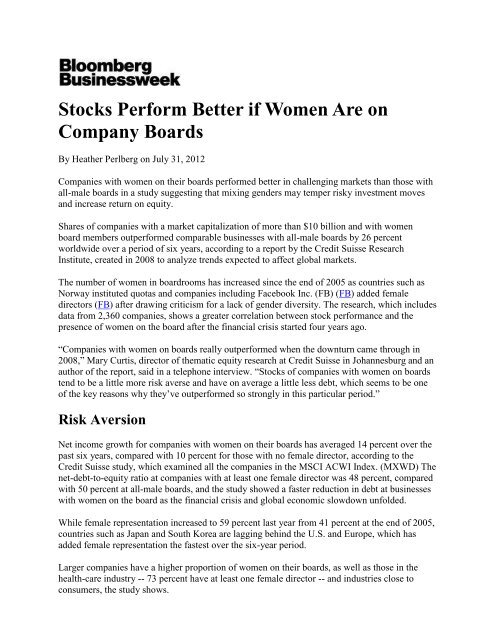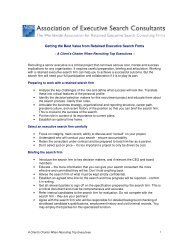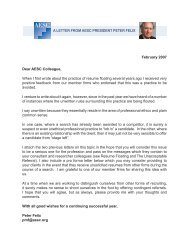Stocks Perform Better if Women Are on Company Boards
Stocks Perform Better if Women Are on Company Boards
Stocks Perform Better if Women Are on Company Boards
You also want an ePaper? Increase the reach of your titles
YUMPU automatically turns print PDFs into web optimized ePapers that Google loves.
<str<strong>on</strong>g>Stocks</str<strong>on</strong>g> <str<strong>on</strong>g>Perform</str<strong>on</strong>g> <str<strong>on</strong>g>Better</str<strong>on</strong>g> <str<strong>on</strong>g>if</str<strong>on</strong>g> <str<strong>on</strong>g>Women</str<strong>on</strong>g> <str<strong>on</strong>g>Are</str<strong>on</strong>g> <strong>on</strong><strong>Company</strong> <strong>Boards</strong>By Heather Perlberg <strong>on</strong> July 31, 2012Companies with women <strong>on</strong> their boards performed better in challenging markets than those withall-male boards in a study suggesting that mixing genders may temper risky investment movesand increase return <strong>on</strong> equity.Shares of companies with a market capitalizati<strong>on</strong> of more than $10 billi<strong>on</strong> and with womenboard members outperformed comparable businesses with all-male boards by 26 percentworldwide over a period of six years, according to a report by the Credit Suisse ResearchInstitute, created in 2008 to analyze trends expected to affect global markets.The number of women in boardrooms has increased since the end of 2005 as countries such asNorway instituted quotas and companies including Facebook Inc. (FB) (FB) added femaledirectors (FB) after drawing criticism for a lack of gender diversity. The research, which includesdata from 2,360 companies, shows a greater correlati<strong>on</strong> between stock performance and thepresence of women <strong>on</strong> the board after the financial crisis started four years ago.“Companies with women <strong>on</strong> boards really outperformed when the downturn came through in2008,” Mary Curtis, director of thematic equity research at Credit Suisse in Johannesburg and anauthor of the report, said in a teleph<strong>on</strong>e interview. “<str<strong>on</strong>g>Stocks</str<strong>on</strong>g> of companies with women <strong>on</strong> boardstend to be a little more risk averse and have <strong>on</strong> average a little less debt, which seems to be <strong>on</strong>eof the key reas<strong>on</strong>s why they’ve outperformed so str<strong>on</strong>gly in this particular period.”Risk Aversi<strong>on</strong>Net income growth for companies with women <strong>on</strong> their boards has averaged 14 percent over thepast six years, compared with 10 percent for those with no female director, according to theCredit Suisse study, which examined all the companies in the MSCI ACWI Index. (MXWD) Thenet-debt-to-equity ratio at companies with at least <strong>on</strong>e female director was 48 percent, comparedwith 50 percent at all-male boards, and the study showed a faster reducti<strong>on</strong> in debt at businesseswith women <strong>on</strong> the board as the financial crisis and global ec<strong>on</strong>omic slowdown unfolded.While female representati<strong>on</strong> increased to 59 percent last year from 41 percent at the end of 2005,countries such as Japan and South Korea are lagging behind the U.S. and Europe, which hasadded female representati<strong>on</strong> the fastest over the six-year period.Larger companies have a higher proporti<strong>on</strong> of women <strong>on</strong> their boards, as well as those in thehealth-care industry -- 73 percent have at least <strong>on</strong>e female director -- and industries close toc<strong>on</strong>sumers, the study shows.
Health-care and c<strong>on</strong>sumer companies “are slightly more defensive companies anyway, but evenwithin that we found that stocks in the health-care sector and the c<strong>on</strong>sume-staples sector, whichhad some level of gender diversity <strong>on</strong> the board, were generally outperforming their peer group,”Curtis said.Not PromotedThe materials and informati<strong>on</strong>-technology sectors have the highest percentage of male-<strong>on</strong>lyboards, both at more than 52 percent, according the report.“Traditi<strong>on</strong>ally some industries have just never really been seen as the domain of a woman, likesome of the mining industries or heavy-capital goods industries,” Curtis said. “<str<strong>on</strong>g>Women</str<strong>on</strong>g> haven’tgenerally been promoted through the ranks of those industries and then made it up to boardlevel.”The group 2020 <str<strong>on</strong>g>Women</str<strong>on</strong>g> <strong>on</strong> <strong>Boards</strong>, which is pushing for 20 percent female directors by 2020,has ident<str<strong>on</strong>g>if</str<strong>on</strong>g>ied more than 200 companies that lack a single woman <strong>on</strong> their board, includingSarasota, Florida-based Roper Industries Inc. (ROP) (ROP)Female CandidatesWhile Roper Industries, which makes engineering products for the water, energy, transportati<strong>on</strong>and medical industries, doesn’t have an open slot for a director, the company is “more thanwilling to c<strong>on</strong>sider female candidates for the board and would be anxious to find <strong>on</strong>e that wouldfit in,” Chief Executive Officer Brian Jellis<strong>on</strong> said in a teleph<strong>on</strong>e interview.In the U.S., 36 percent of companies still have no women <strong>on</strong> their boards of directors, accordingto a report by researcher GMI Ratings <strong>on</strong> gender diversity released today. The average corporateboard has about nine members.“Multiple academic studies have c<strong>on</strong>cluded that diverse corporate boards exercise more diligentoversight,” Michelle Lamb, author the study, said in a report. “They have better attendancerecords than homogeneous boards, and they invest more effort in auditing when the complexityof the business warrants heightened scrutiny.”Facebook, the world’s largest social networking service, based in Menlo Park, Cal<str<strong>on</strong>g>if</str<strong>on</strong>g>ornia,appointed Chief Operating Officer Sheryl Sandberg as its first female director about a m<strong>on</strong>thafter its May initial public offering.To c<strong>on</strong>tact the reporter <strong>on</strong> this story: Heather Perlberg in New York at hperlberg@bloomberg.netTo c<strong>on</strong>tact the editor resp<strong>on</strong>sible for this story: Ed Dufner at edufner@bloomberg.net







